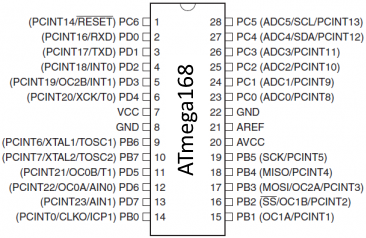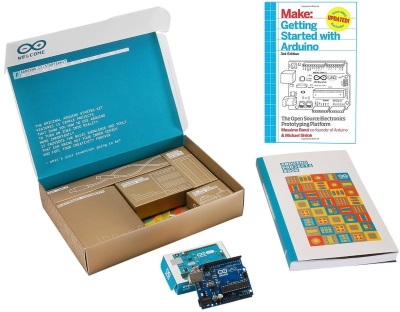Arduino is an open source community for the development, extension, and improvement of an open microcontroller platform. What this means is that no one owns the exclusive rights or owns the intellectual property rights for the platform. It's a combination of software and hardware, and its development is shepherdfed by the community. If you use it and extend its functionality, you are required to document that functionality and donate that intelectual property back to the Arduino community.
The benefit of the open source Arduino is that the software is free and the hardware is cheap. This makes it one of the cheapest platforms on which to develop prototypes. Also by design, the software is easy to learn and it is supported by a huge community of people who have shared their projects. So you can download code and plans for robots, planes, remote controlled vehicles, drones, sprinkler controllers, and many more.

Prior to 2015 Arduinos used the AtMel megaAVR series of chips, specifically the ATmega8, ATmega168, ATmega328, ATmega1280, and ATmega2560. In 2015 units by other manufacturers were added.
The Arduino project provides the Arduino integrated development environment (IDE) which supports the C and C++ programming languages. Although the IDE supports inline assembly, you can't program the Arduino in assembly directly because the USB driver which allows the IDE to connect to a PC requires the embeded bootloader.
Arduino Open Source Microcontroller Starter Kit
This Exclusive Arduino Deluxe Bundle includes everything you need to get started with Arduino - Including the only Official Starter Kit from Arduino (includes the Arduino Uno Revision 3 board), MAKE Magazine's "Getting Started with Arduino: The Open Source Electronics Prototyping Platform" and Speed Kits handy PIN-OUT Reference Chart for the Uno R3. No need to shop around for breadboards, sensors, LEDS, etc. This kit has it all and is designed to take you from Novice to Expert providing hours of instruction and a multitude of projects.
M. Dashiell says,"This is basically the starter kit bundled with the Make book. I love the Make book - it is a really good place to get started with the Arduino platform. I personally think the official kit is the way to go as everything is well packaged and clearly labeled and it seems like really high quality. I am glad I got everything I need in one package - this was definitely the way to go.
More Computer Architecture Articles:
• Multithreaded Programming Process' and Threads
• How Computer Chips are Made
• Multi-Processor Scheduling
• Integrated Circuit Design Flow
• AMD's Phenom II Processor
• Shortest-Job-First CPU Scheduling Algorithm
• Dynamic Loading of Program Routines and Dynamically linked libraries (DLLs)
• Priority CPU Scheduling Algorithm
• Difference between Stack, Heap, and Queue
• Logical Versus Physical Memory Addresses


